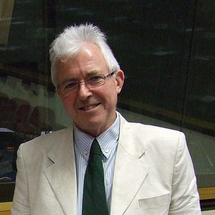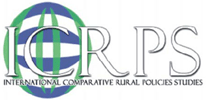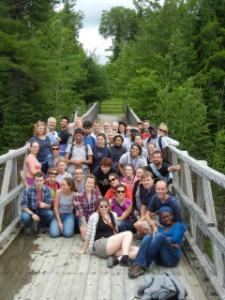by John Bryden 20/01/2014
Tom Johnson, Tony Fuller and I prepared a paper on the history of ICRPS since its inception in autumn 2002 and its possible future directions for the tenth anniversary conference of the ICRPS summer institutes. This was held during the tenth summer institute in Bologna, June 2013. We did so as the founders of ICRPS. This article deals with the history of ICRPS and its partners. It will be followed by three others, the second and third dealing with the evolution of the curriculum and consortium activities, and the fourth looking at possible future options.
ICRPS built on several previous collaborations between the founders including the Europe-US-Canada programme on comparative rural policy funded by the Ford Foundation, the Arkleton Trust, the Aspen Institute, the USDA, and the Donner Canada Foundation between 1986 and 1992, the University of Guelph’s PhD program on Sustainable Development started in 1994-5, the various activities of the Arkleton Trust, the Arkleton Trust (Research) Ltd, the Arkleton Institute at Aberdeen University, the Rural Policy Research Institute in the US, and the Canadian Rural Restructuring Foundation and its predecessors in Canada. In 2001-2, I was visiting professor at the Rural Policy Research Institute (RUPRI) at Missouri-Columbia for a year, and in the autumn of 2002 , Tom and I set up a meeting to discuss a possible joint ICRPS program with colleagues from Missouri-Columbia, Aberdeen, Guelph and Corvinus University in Hungary. The meeting was hosted by RUPRI and the Truman School of Public Policy.
This ‘founding’ meeting proposed to set up ICRPS as a consortium project, the goal being to raise capacities in relation to comparative policy research as well as policy making in a changing world by joint courses and experiences, joint comparative research, and building networks between the rural policy makers and academics of the future in Europe and North America.
We considered the following elements as part of the ICRPS program.
- A three week summer school, for Masters, PhD and Professional students oscillating annually across the Atlantic, jointly taught and funded. Students normally to attend two summer schools – one in N America, one in Europe – and to undertake comparative policy research as part of their programme
- An annual conference to be built into the summer school, at which students would present their comparative work as a basis for publishable papers.
- Three jointly prepared on-line courses on various topics including policy and programme evaluation, policy theory and comparative method, and local rural development.
- A new Journal of Rural Policy Studies, partly as an outlet for the work of faculty and students.
- Exchanges of PhD and Masters Students, with placements or internships organised.
With the help of Nonita Yapp at Guelph, Tony and I prepared a funding application to the Canadian Education Ministry and the European Commission under the EU-Canada cooperation programme on further and higher education. This focused on the proposed ICRPS student-oriented activities, especially the summer institute. Unfortunately this programme was either for Canada and Europe OR for US and Europe, so it did not allow us to have the three-way programme originally envisaged. However, the funding bid succeeded and we prepared the first summer school at Guelph in 2004. Of course RUPRI was not to be left out, and Tom managed to self-fund himself and students from Missouri to take part in that and all subsequent summer institutes. The EU programme basically funded Masters and PhD students to attend a summer school, and was a pump-priming programme lasting three years. The ICRPS model within the programme was unique – i.e. it did not fit the standard pattern (learning abroad) for EU-North America cooperation programmes in further or higher education, and still does not.
We also included a larger consortium in the funding bid and ICRPS summer schools. The first consortium comprised Guelph, Brandon, and University of Quebec at Rimouskie in Canada, Columbia-Missouri in the US, Aberdeen University (Scotland), Louvain KN University (Belgium), Corvinus University (Hungary) and the Autonomous University of Barcelona (Spain). Over time we have lost some partners, but gained new ones. In particular we lost Louvain, Corvinus and Aberdeen in Europe in the first five or so years, but we gained the University of the Highlands and Islands, NILF-UMB in Norway, Bologna in Italy, and UCD-TEAGASC in Ireland. There were no losses in North America, but we did gain new partners there – Oregon State and Penn State in the US, Universidad Autónoma del Estado de México, in Mexico and, later, Concordia in Canada. In 2009, the US partners received a three year grant from the US government to support and expand their involvement in the consortium.
The funding lasted three years, since which time the summer institute and related activities including placement of PhDs in partner institutions has been largely self-funded by faculty and students.
In the next article, I will discuss the evolution of the ICRPS curriculum and the structure and focus of the summer institute, as well as something about faculty and students.
Photo: The ICRPS 2012 Quebec Group Photo
 JOHN BRYDEN is one of the ICRPS consortium founders and has a PhD in economic development. Among his merits, he is Professor Emeritus at the University of the Highlands and Islands and Professor of Human Geography Emeritus at the University of Aberdeen, both Scotland. He now lives in Ås, Norway. More on John´s work at www.johnbryden.com
JOHN BRYDEN is one of the ICRPS consortium founders and has a PhD in economic development. Among his merits, he is Professor Emeritus at the University of the Highlands and Islands and Professor of Human Geography Emeritus at the University of Aberdeen, both Scotland. He now lives in Ås, Norway. More on John´s work at www.johnbryden.com

